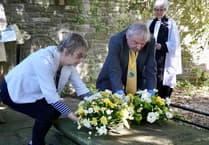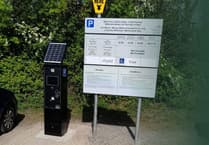A MAN who made his home in a tree-house which it is alleged didn’t have planning permission has been giving evidence in his defence at his Crown Court trial.
Eddie McIntosh faces 18 charges in the case brought by Powys County Council which alleges he failed to comply with enforcement notices by continuing to use his smallholding as a permanent residence and remove structures he’d built without planning permission.
He had appealed the enforcement notices, issued in April 2015, and in January 2016 an independent planning inspector said though the site could be used for agricultural purposes ruled it did not have permission for recreational use, including as a retreat, or as a permanent residence.
The defence case opened on Wednesday when the 52-year-old took to the stand and gave evidence of how he first bought the then abandoned smallholding, he named Mellowcroft, off the A44 at Llandegley, near Llandrindod Wells, in 2006 which he then ran as a rural retreat offering education and alternative therapies as well as off-grid holiday accomodation.
He was also questioned, by his defence counsel Jonathan Rees, about the ongoing work to build a seven turbine wind farm, known as Hendy Windfarm, near the Llandegley Rocks beauty spot which is above Mellowcroft.
Giving evidence he also explained how his marriage with the mother of his youngest daughter, now aged six, fell apart under the strain of the planning dispute.
From the witness stand the father-of-three said Powys council first alleged the site didn’t have planning permission in 2013 but a council planning officer had first visited Mellowcroft in 2006 and again in 2008.
He had a website up and running and said his intention was to see if Mellowcroft could be a viable business. He said the retreat, which also allowed community groups to use the site and its allotments, was proving successful and in 2012 featured in an episode of Kevin McCloud’s Man Made Home on Channel 4.
The first enforcement notice was issued in December 2013. The defendant said: "It came out of the blue with no warning, we had a good relationship with the planning officer. I was transparent in everything I did and had an open invitation to come and see the site. I wasn’t there all the time I was travelling in the motor home."
Powys council then withdraw those notices in 2014 and in March 2015 he had a meeting with then council chief executive Jeremy Patterson.
He said: "I went to meet the chief executive to find out what was going on I also had information I wanted to pass on to the chief executive about a whistle blower who works for the council.
"I was invited to submit a planning application but within a month, and with the application not decided, the council served me with the two enforcement notices."
During his evidence the defendant was also questioned about the Hendy Windfarm.
Mr Rees asked if a stone track running across Llandegley Common, to the north of Mellowcroft, was well used.
The defendant replied: "It has been used extensively over the last two months. There’s been a major development called Hendy Windfarm."
He said those with grazing rights on the common were in dispute with the hedge fund behind the wind farm development over access over the common.
Mr Rees also asked about a photograph of a wind turbine he’d previously shown to the court and if it belonged to Hendy.
The smallholder replied: "Yes it does. This is the one that has just been erected in haste. It had to be erected by January 31 for them (Hendy Windfarm) to receive a £12 million subsidy, a further seven are to be erected."
His Honour Judge Christopher Vosper QC said he understood the wind farm is currently under construction and the defendant explained: "That one has already been put up. I believe it is a second hand turbine it doesn’t actually generate any electricity."
Asked, by Mr Rees, about the height of the turbines the defendant said they are 350ft from the ground with blades or around 120ft.
Mr Rees asked when the defendant first became aware of the Hendy Windfarm and he replied: "Probably about 2015/16. It was never going to go ahead, the local people were objecting. It just didn’t look likely, where it was to be located there are a number of historical monuments. It just seemed like pie in the sky."
The defendant also gave details of the planning application he had submitted, which he said he had spent £15,000 on and included plans for a permanent house on site.
But he said as Welsh environment body Natural Resources Wales had said there was no record of otter or water vowels within one kilometre of Mellowcroft he refused to comply with the council’s request for a survey but had other detailed wildlife and ecological surveys completed.
At the 2015 public inquiry, held by the planning inspector, the defendant said a consultant working for Powys council produced evidence of otters in the area.
He said: "Atkins are a private environmental consultancy and said (at the inquiry) one otter had been spotted 20 years ago 1.6km away from Mellowcroft. He gave the inspector no choice as otters are a European protected species."
Asked, by Mr Rees, what he knew about Atkins the defendant said: "Atkins also represented Hendy Windfarm, a grave conflict of interest."
The defendant said he regretted that he was not legally represented at the planning inquiry.
Mr Rees also took the defendant through a series of structures he’d erected on the site which form the basis of the charges.
He explained none were permanent structures and told how many are used, or have been adapted, for use for agricultural purposes. He said he had started dismantling the tree-house by the time Powys council planning officer Gemma Bufton visited in January 2018.
Asked to describe the wind turbine he had erected at Mellowcroft, which he used with solar panels to power an electric fence, said: "It is about the size of a Land Rover wheel."
While giving evidence he also explained that he only lived in temporary structures at Mellowcroft and before he got married, in 2012, would often spend time away from the smallholding.
He said while the family lived in the tree-house they would sleep in his motor home and when that fell into a state of disrepair, after the appeal had been lost, they lived in converted lorry trailer, which is on stilts, and where he still lives.
The trial continues
Treehouse trial hears how smallholder’s life ’destroyed’ - see this week’s Brecon & Radnor Express on sale now




